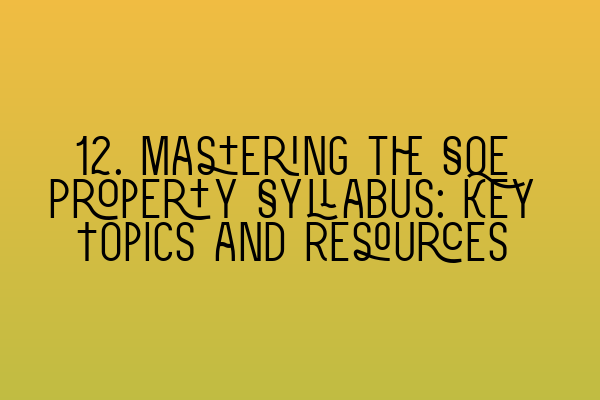Mastering the SQE Property Syllabus: Key Topics and Resources
As a prospective solicitor, mastering the SQE (Solicitors Qualifying Examination) Property syllabus is essential to succeed in your career. Property law deals with the legal aspects of buying, selling, and leasing real estate properties. It is a fundamental area of law that all future solicitors must master.
In this blog post, we will outline the key topics covered in the SQE Property syllabus and provide you with valuable resources to aid your preparation. Whether you are a law student or a qualified lawyer transitioning into practice, this guide will help you navigate the depths of property law knowledge required to pass the SQE exam.
1. Estates and Interests in Land
Understanding the different types of estates and interests in land is crucial for property law. The SQE syllabus covers topics such as freehold estates, leasehold estates, and easements. Familiarize yourself with the definitions, characteristics, and principles governing each type of estate or interest.
Resource: To enhance your understanding, you can access practice exam questions on estates and interests in land through this SQE 1 Practice Exam Questions resource.
2. Land Registration
Land registration is an essential part of property law. The SQE exam will test your knowledge on topics such as land registration procedures, priority rules, and the Land Registry. It is crucial to understand the legal requirements for registering property and the implications it has on ownership rights.
Resource: To practice and assess your knowledge on land registration, you can access mock exams through this SQE 1 Practice Mocks FLK1 FLK2 resource.
3. Leases and Tenancies
Leases and tenancies are frequently encountered in property transactions. The SQE syllabus covers topics such as leasehold covenants, rent reviews, and termination of leases. It is critical to understand the legal obligations and rights of both landlords and tenants in lease agreements.
4. Co-ownership
Co-ownership involves situations where multiple individuals own a property together. The SQE exam may assess your understanding of co-ownership principles, including joint tenancies, tenancies in common, and the implications of severance.
5. Mortgages
Mortgages are essential financing tools for property transactions. The SQE syllabus covers topics such as mortgage creation, rights and obligations of mortgagees and mortgagors, and the foreclosure process. Understanding the legal framework governing mortgages is vital to practicing property law.
6. Sale and Purchase of Land
The sale and purchase of land is one of the core areas of property law. The SQE exam will test your knowledge on topics such as contract formation, the legal requirements for a valid contract, and the implications of mistakes or misrepresentations in land transactions.
7. Landlord and Tenant
Landlord and tenant relationships are integral to property law. The SQE syllabus covers topics such as rental agreements, landlord obligations, tenant rights, and eviction procedures. Understanding the legal framework governing these relationships is essential for advising clients on their rights and responsibilities.
8. Conveyancing
Conveyancing is the legal process of transferring property ownership from one party to another. The SQE exam may assess your knowledge on conveyancing procedures, including drafting contracts, conducting searches, and completing the transfer of ownership.
9. Planning Law
Planning law deals with the legal regulations and processes surrounding land development and use. The SQE syllabus may cover topics such as planning permissions, lawful development certificates, and the role of local planning authorities. Understanding the legal framework for planning law is crucial when advising clients on development projects.
10. Professional Conduct and Ethics
Professional conduct and ethics are fundamental aspects of the legal profession. The SQE exam may include questions on the Solicitors Regulation Authority (SRA) Code of Conduct, confidentiality, conflict of interest, and professional relationships. Familiarize yourself with the ethical obligations and responsibilities of a solicitor in property transactions.
Resource: To stay updated on the latest SRA rules and regulations, you can access helpful courses through this SQE 2 Preparation Courses resource.
Summary
Mastery of the SQE Property syllabus is crucial for aspiring solicitors. By understanding key topics such as estates and interests in land, land registration, leases and tenancies, co-ownership, mortgages, sale and purchase of land, landlord and tenant relationships, conveyancing, planning law, and professional conduct and ethics, you can enhance your chances of success in the SQE exam.
Remember, consistent practice and in-depth understanding are the keys to success. To further enhance your preparation, you can access comprehensive courses through this SQE 1 Preparation Courses resource.
Good luck with your journey towards becoming a qualified solicitor!
If you want to know more about the SRA SQE exam dates, you can visit this SRA SQE Exam Dates resource.
